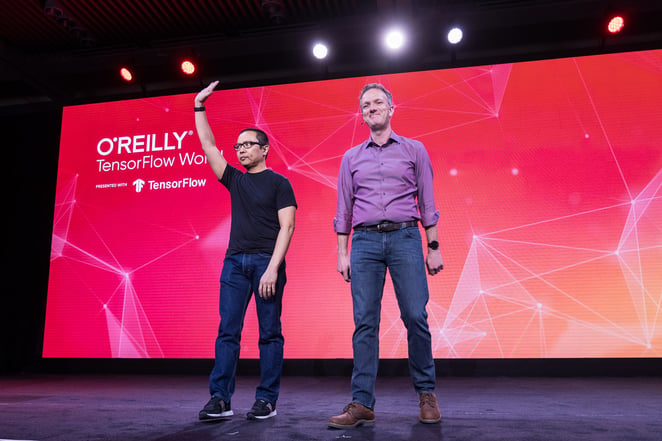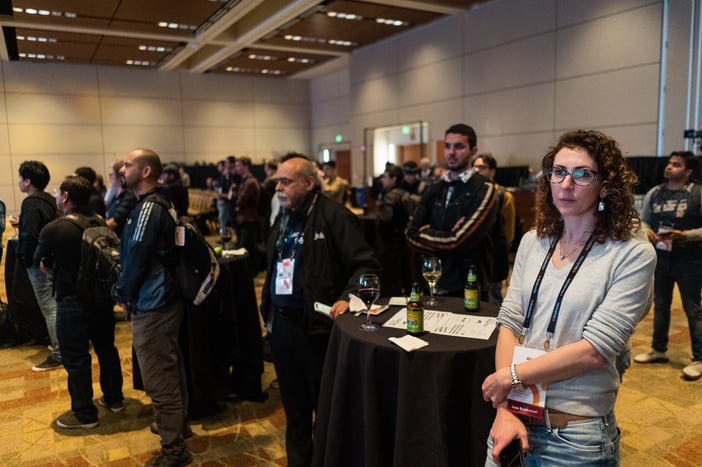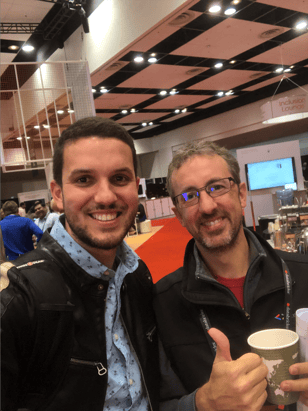Observations and Insights from TensorFlow World 2019
 Google and O'Reilly came together to present TensorFlow World 2019. TensorFlow World is the first conference for the TensorFlow community. For those who are not familiar with it, TensorFlow is an intensive computing framework designed to build, train and serve neural network models. TensorFlow Ecosystem is an end-to-end open-source platform for machine learning, with more than 2,000 active contributors on Github. The event took place at the Santa Clara Convention Center in Santa Clara, California. Based on my impressions, the number of attendees reached a little bit over one thousand. On Monday and Tuesday, two days of training took place and several 3-hour tutorials. Tuesday night, the poster sessions took place. On Wednesday and Thursday, we had the keynote speakers and the main presentation sessions on different topics around TensorFlow technology and use cases. Not unlike previous Google events, some news has been released early, such as TensorFlow Enterprise, Tensorboard.dev and TensorFlow Trusted Program. TensorFlow Enterprise addresses the needs of companies that have already implemented or are in the process of implementing AI applications requiring enterprise-grade support, cloud-scale performance and managed services. For example, TF Enterprise includes long-term version support and keeps security patches and bug fixes for up to three years. The platform chosen is Google Cloud Platform for the moment, but it is not certain if the TensorFlow team will join forces with Microsoft Azure and Amazon Web Services in the future. Tensorboard.dev will be in preview by the time I have written this blog post. It is essentially a platform that enables you to upload and share your machine learning (ML) experiment results with anyone without having to deal with storage and access, supported by a friendly user API and Web UI. Besides that, TensorFlow Trusted Program aims to connect businesses with system integrators who are experienced in building and deploying ML solutions that can help them to innovate faster, solve smarter, and scale bigger. Soon, Pythian will be accounted for as a TensorFlow Trusted Partner.
Google and O'Reilly came together to present TensorFlow World 2019. TensorFlow World is the first conference for the TensorFlow community. For those who are not familiar with it, TensorFlow is an intensive computing framework designed to build, train and serve neural network models. TensorFlow Ecosystem is an end-to-end open-source platform for machine learning, with more than 2,000 active contributors on Github. The event took place at the Santa Clara Convention Center in Santa Clara, California. Based on my impressions, the number of attendees reached a little bit over one thousand. On Monday and Tuesday, two days of training took place and several 3-hour tutorials. Tuesday night, the poster sessions took place. On Wednesday and Thursday, we had the keynote speakers and the main presentation sessions on different topics around TensorFlow technology and use cases. Not unlike previous Google events, some news has been released early, such as TensorFlow Enterprise, Tensorboard.dev and TensorFlow Trusted Program. TensorFlow Enterprise addresses the needs of companies that have already implemented or are in the process of implementing AI applications requiring enterprise-grade support, cloud-scale performance and managed services. For example, TF Enterprise includes long-term version support and keeps security patches and bug fixes for up to three years. The platform chosen is Google Cloud Platform for the moment, but it is not certain if the TensorFlow team will join forces with Microsoft Azure and Amazon Web Services in the future. Tensorboard.dev will be in preview by the time I have written this blog post. It is essentially a platform that enables you to upload and share your machine learning (ML) experiment results with anyone without having to deal with storage and access, supported by a friendly user API and Web UI. Besides that, TensorFlow Trusted Program aims to connect businesses with system integrators who are experienced in building and deploying ML solutions that can help them to innovate faster, solve smarter, and scale bigger. Soon, Pythian will be accounted for as a TensorFlow Trusted Partner.  After citing some news, it is time to get back to the main sessions. In this edition, I could identify a huge emphasis on four main topics: building scalable, distributed and high-performance solutions using GPUs and TPU; advancements with natural language processing architectures; developing IoT, smartphones and frontend applications using TensorFlow.js and Lite; and implementing end-to-end ML platforms using TensorFlow Extended. I would say that discussions usually involved one of those four topics. In addition, Aurélien Géron, a Machine Learning Engineer from Kiwisoft, called everyone's attention to his contributions to the community. Aurélien is the author of the book "Hands-On Machine Learning with Scikit-Learn, Keras, and TensorFlow: Concepts, Tools, and Techniques to Build Intelligent Systems". The book is a reference guide for building supervised, unsupervised and reinforcement learning solutions using TensorFlow and Keras. Most importantly, the second edition of the book has examples implemented on TensorFlow 2.0 GA in last October. I have no words to express my admiration for this guy. The book is already an Amazon bestseller.
After citing some news, it is time to get back to the main sessions. In this edition, I could identify a huge emphasis on four main topics: building scalable, distributed and high-performance solutions using GPUs and TPU; advancements with natural language processing architectures; developing IoT, smartphones and frontend applications using TensorFlow.js and Lite; and implementing end-to-end ML platforms using TensorFlow Extended. I would say that discussions usually involved one of those four topics. In addition, Aurélien Géron, a Machine Learning Engineer from Kiwisoft, called everyone's attention to his contributions to the community. Aurélien is the author of the book "Hands-On Machine Learning with Scikit-Learn, Keras, and TensorFlow: Concepts, Tools, and Techniques to Build Intelligent Systems". The book is a reference guide for building supervised, unsupervised and reinforcement learning solutions using TensorFlow and Keras. Most importantly, the second edition of the book has examples implemented on TensorFlow 2.0 GA in last October. I have no words to express my admiration for this guy. The book is already an Amazon bestseller.  The training sessions and tutorials at TensorFlow World 2019 were worth attending for all professionals, from beginner to experienced. Also, the talk sessions covered multiple market verticals and ML use cases. Those who attended the event had the opportunity to meet data scientists, machine learning engineers and researchers from companies like NVIDIA, Intel, Google, Spotify, Airbnb, IBM, Microsoft, Uber, LinkedIn and Twitter. Lastly, providing free access to Great America Amusement Park was a unique opportunity to have fun, connect with people and ride on the roller coasters.
The training sessions and tutorials at TensorFlow World 2019 were worth attending for all professionals, from beginner to experienced. Also, the talk sessions covered multiple market verticals and ML use cases. Those who attended the event had the opportunity to meet data scientists, machine learning engineers and researchers from companies like NVIDIA, Intel, Google, Spotify, Airbnb, IBM, Microsoft, Uber, LinkedIn and Twitter. Lastly, providing free access to Great America Amusement Park was a unique opportunity to have fun, connect with people and ride on the roller coasters.
Share this
Previous story
← Can you run Hadoop in the cloud?You May Also Like
These Related Stories
Reader Favourites: Some of 2022’s Most Popular Pythian Blogs


Reader Favourites: Some of 2022’s Most Popular Pythian Blogs
Dec 30, 2022 12:00:00 AM
6
min read
How Cloud Computing Has Transformed Over the Last Decade
![]()
How Cloud Computing Has Transformed Over the Last Decade
Apr 8, 2020 12:00:00 AM
6
min read
Top Tips for Protecting Gmail from Cyberattacks


Top Tips for Protecting Gmail from Cyberattacks
Aug 8, 2023 12:00:00 AM
4
min read

No Comments Yet
Let us know what you think